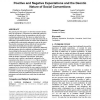Free Online Productivity Tools
i2Speak
i2Symbol
i2OCR
iTex2Img
iWeb2Print
iWeb2Shot
i2Type
iPdf2Split
iPdf2Merge
i2Bopomofo
i2Arabic
i2Style
i2Image
i2PDF
iLatex2Rtf
Sci2ools
106
click to vote
ICAIL
2003
ACM
2003
ACM
Positive and Negative Expectations and the Deontic Nature of Social Conventions
The general goal of the paper is to show the normative/deontic nature of conventions. Conventions are traditionally defined as regularity of behavior based on expectations evolved to solve coordination problems [14]. The thesis we defend is that the cognitive attitude of expectations is not only characterized by an anticipatory representation (belief) of a future state of affairs but is coupled with a motivational component (a goal on this state). The possible convergence between beliefs and corresponding goals allows the identification of positive and negative expectations. We argue that in positive expectations (differently from the negative ones) lies implicitly an influencing act aimed at prescribing that the expected event will be realized. We consider conventions as analyzed in Game Theory as regularity of behavior based on positive expectations. These conventions entail the deontic component of prescription. Each agent prescribes (and is subject to prescription) conformity to t...
| Added | 05 Jul 2010 |
| Updated | 05 Jul 2010 |
| Type | Conference |
| Year | 2003 |
| Where | ICAIL |
| Authors | Cristiano Castelfranchi, Luca Tummolini |
Comments (0)

